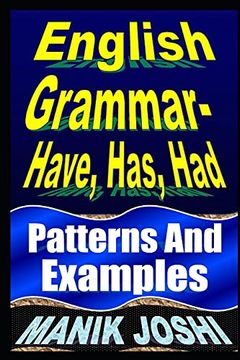English Grammar- Have, Has, Had: Patterns and Examples (English Daily Use) (in English)
Synopsis "English Grammar- Have, Has, Had: Patterns and Examples (English Daily Use) (in English)"
This book covers the following topics: verb - 'to have' -- part (a). ordinary verb -- 'have' -- part (b). auxiliary verb -- 'have' -- 1. have/has/had + third form of verb -- 2. have/has/had + been + third form of verb -- 3. have/has/had + been + -ing form of verb -- 4. have/has/had + been -- 5. have/has/had + had -- part (c). modal verb -- 'have' -- 1a. [have/has ] to + first form of verb] -- 1b. [have/has ] to + be + third form of verb] -- 2a. [had ] to + first form of verb] -- 2b. [had ] to + be + third form of verb] -- 3a. [have/has ] had + to + first form of verb] -- 3b. [have/has ] had + to + be + third form of verb] -- 4a. [had ] had + to + first form of verb] -- 4b. [had ] had + to + be + third form of verb] -- 5a. [having ] to + first form of verb] -- 5b. [to ] have + to + first form of verb] -- exercises: 1(a) and 1(b) -- exercises: 2(a) and 2(b) -- exercises: 3(a) to 3(c) --- Sample This: -- VERB - 'HAVE' -- Verb 'HAVE' is used as an AUXILIARY VERB as well as a MAIN (ORDINARY) VERB. It also does the function of 'MODAL VERB'. --- MAIN VERB: When used as the main verb, the verb 'have' is followed by an object. AUXILIARY VERB: When used as an auxiliary verb, it forms the perfect and perfect continuous tenses. [Note: 'Auxiliary verb' is a verb which is used with the main verb to show tenses, etc.] --- MODAL VERB: 'Modal verb' is a verb that is used with the main verb to express intention, permission, possibility, probability, obligation, etc. Following patterns are possible: "have to, has to, had to, have had to, has had to, had had to, having to" --- FORMS OF VERB 'HAVE': Present form - Have or Has; Past form - Had; Past Participle form - Had --- IMPORTANT POINTS ABOUT VERB 'HAVE' - 'Have' Is Used With Subject 'I, We, You and They' + All Plural Subjects; 'Has' Is Used With Subject 'He and She' + All Singular Subjects; 'Had' Is Used With All Subjects (Singular or Plural) --- USE OF 'HAVE GOT' - In some senses, you can also use 'have got'. 'have got' is especially used in 'British English'. She has got a loose temper. (= She has a loose temper.) I have got a backache. (= I have a backache.) He has got a management degree (= He has a management degree.) --- PART (A). Ordinary Verb -- 'HAVE' - As the Main Verb, 'Have' is used to express different kinds of thoughts: Some of them are as follows: to possess, to own, to show quality, to show a feature, to suffer from illness, to perform a particular action, to produce a particular effect, to trick, to cheat, to hold, to experience, to receive, to allow, to put in a position, etc. When used as the main verb, 'have' is followed by an object. - I have an American passport. He has an American passport. She had an American passport. --- Negative Forms Of Main Verb 'Have': Have - Do not have (Don't have); Has - Does not have (Doesn't have); Had - Did not have (Didn't have) - I don't have an American passport. He doesn't have an American passport. She didn't have an American passport. NOTE- Instead of using do/does/did, you can also use modal verbs (may, can, must, should, etc.) in negative sentences to show possibility, intention, obligation, etc. - I may not have an American passport. He may not have an American passport. She may not have an American passport. You can also use 'Never have/Never has/Never had' to emphasize negative statements. - I never have my breakfast at 7 am. This park never has any trace of greenery. We never had the guts to question him. --- Interrogative Patterns Of Main Verb 'Have': Have - Do + Subject + Have; Has - Does + Subject + Have; Had - Did + Subject + Have --- Do I have an American passport? Does he have an American passport? Did she have an American passport?

